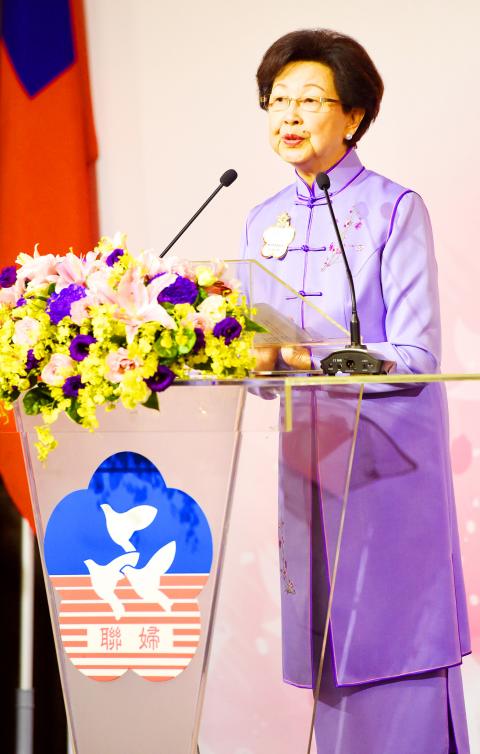The National Women’s League yesterday urged the government to exercise caution pursuing transitional justice, saying that it should not be used as a pretext to attack political rivals.
The remarks were part of a speech prepared by National Women’s League chairwoman Cecilia Koo (辜嚴倬雲), who asked league member Tien Ling-ling (田玲玲) to deliver the speech at a Taipei event celebrating International Women’s Day in her absence.
“If justice is defined as oppressing a competing political party or organizations that have once supported those parties with no regard for historical truth, then justice runs the risk of being unjust,” Tien said.

Photo: Liu Hsin-de, Taipei Times
Tien said the league, which has dedicated to protecting women’s rights and helping the disadvantaged, was of the opinion that the pursuit of transitional justice should be free of selfish motives.
Established by former president Chiang Kai-shek’s (蔣介石) wife, Soong Mayling (宋美齡), in 1950 and headed by her for decades, the league has seen its assets under government scrutiny, as its activities benefited from its close ties to the Chinese Nationalist Party (KMT).
Much of its funding came from the Military Benefit Tax, which was levied on the US dollar value of all imported goods between 1955 and 1989.
Democratic Progressive Party Legislator Lai Jui-lung (賴瑞隆) accused the league of continued obfuscation of its finances and refusal to cooperate with investigations launched by the Ill-gotten Party Assets Settlement Committee.
Whether a political or civic group, the league should operate under principles of financial transparency, Lai said.
During the KMT’s decades-long authoritarian regime, the league was able to amass trillions of New Taiwan dollars from the money collected from the tax, Lai said.
New Power Party Legislator Hsu Yung-ming (徐永明) said the league was putting the cart before the horse, as transitional justice seeks to achieve is the correcting of injustices leftover from authoritarian regimes and righting history.
The league’s intention to resolve past injustices through donations does not constitute transitional justice, Hsu said, adding that the league should not seek to process its assets prior to investigation.
The Ministry of Health and Welfare should turn down the league’s donations, Hsu said, referring to the NT$16 billion (US$518.4 million) offered by the league on Monday.
Civil Affairs Department Deputy Director Lo Rui-ching (羅瑞卿) said the ministry hoped that the league would be transparent about its finances.

The Grand Hotel Taipei on Saturday confirmed that its information system had been illegally accessed and expressed its deepest apologies for the concern it has caused its customers, adding that the issue is being investigated by the Ministry of Justice Investigation Bureau. The hotel said that on Tuesday last week, it had discovered an external illegal intrusion into its information system. An initial digital forensic investigation confirmed that parts of the system had been accessed, it said, adding that the possibility that some customer data were stolen and leaked could not be ruled out. The actual scope and content of the affected data

DO THEY BITE IT? Cats have better memories than people might think, but their motivation is based entirely around the chance of getting fed Cats can remember the identity of the people who fed them the day before, Taipei-based veterinarians said on Friday, debunking a popular myth that cats have a short memory. If a stray does not recognize the person who fed them the previous day, it is likely because they are not carrying food and the cat has no reason to recognize them, said Wu Chou Animal Hospital head Chen Chen-huan (陳震寰). “When cats come to a human bearing food, it is coming for the food, not the person,” he said. “The food is the key.” Since the cat’s attention is on the food, it

‘LIKE-MINDED PARTNER’: Tako van Popta said it would be inappropriate to delay signing the deal with Taiwan because of China, adding he would promote the issue Canadian senators have stressed Taiwan’s importance for international trade and expressed enthusiasm for ensuring the Taiwan-Canada trade cooperation framework agreement is implemented this year. Representative to Canada Harry Tseng (曾厚仁) in an interview with the Central News Agency (CNA) said he was increasingly uneasy about Ottawa’s delays in signing the agreement, especially as Ottawa has warmed toward Beijing. There are “no negotiations left. Not only [is it] initialed, we have three versions of the text ready: English, French and Mandarin,” Tseng said. “That tells you how close we are to the final signature.” Tseng said that he hoped Canadian Prime Minister Mark Carney

President William Lai (賴清德) yesterday bestowed one of Taiwan’s highest honors on Saint Vincent and the Grenadines (SVG) Ambassador Andrea Clare Bowman in recognition of her contributions to bilateral ties. “By conferring the Order of Brilliant Star with Grand Cordon on Ambassador Bowman today, I want to sincerely thank her, on behalf of the Taiwanese people, for her outstanding contribution to deepening diplomatic ties between Taiwan and SVG,” Lai said at a ceremony held at the Presidential Office in Taipei. He noted that Bowman became SVG’s first ambassador to Taiwan in 2019 and